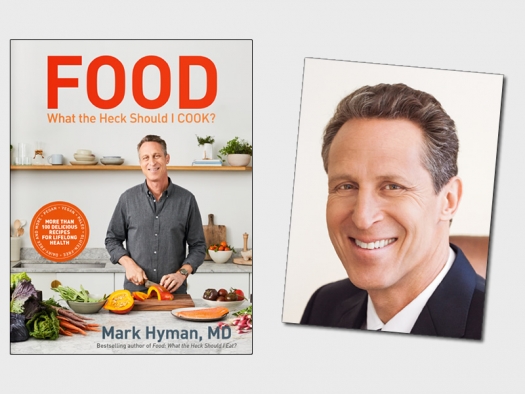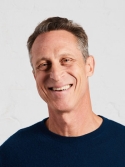Book announcement
MarkHymanFoodWhattheHeckShouldICook.jpg

Food: What the Heck Should I Cook? by Mark Hyman, MD
In the diet wars, there are a few epic battles happening – low fat or high fat? Paleo or vegan? It’s all a bit confusing, and every day a new piece of evidence seems to come out in favor of one diet over the other. What we believe to be true one day is discredited the next and the cycle goes on and on. The challenge with most diets is that they are exclusive, and the truth is that most of us eat on a spectrum; most of us are not exclusively herbivores or carnivores; most of us are omnivores.
My friend and journalist Anahad O’Connor recently wrote an article titled “Is There an Optimal Diet for Humans?” The article discussed a study published in the journal Obesity Reviews which found that most likely, there is no single perfect diet for human beings. This may or may not surprise you, but just look around. The indigenous Pima of Arizona ate 80 percent of their diet from carbs including mesquite, acorns, and wild plants. The Samburu people in Kenya consume mostly milk with a little bit of meat every now and then. There are cultures all around the world thriving on various diets, and even though they might be fundamentally different, there are a few key commonalities that help individuals thrive.
In the words of my friend Anahad, “Almost all of them eat a mix of meat, fish, and plants, consuming foods that are generally packed with nutrients. In general, they eat a lot more fiber than the average American. Most of their carbohydrates come from vegetables and starchy plants with a low glycemic index, meaning they do not lead to rapid spikes in blood sugar.”
It sounds simple, but in the West, we’ve drastically moved away from these basic principles. In America, most people get their fruits from fruit juice and their vegetables on top of their pizza. Refined, starchy carbohydrates are a staple in most meals, and we are getting nowhere near the amount of fiber we once used to.
I’ve tried pretty much every diet out there. I was vegan for a while, and then I went Paleo, and finally, I got fed up with the labels. I’m not perfect 100% of the time, and I do not expect anyone else to be perfect either. But the one thing that I have noticed throughout all of the different diets I’ve tried is that I never feel good when I eat too many refined carbs and sugars and not enough fiber or protein. I let that be my guiding principle: eat real foods, lots of plants, healthy protein and fat, and minimize processed sugars and carbs.
Still, I know that many of my patients thrive with structure. With my Pegan philosophy, I aimed to create structure and flexibility so that any of my patients, vegan, Paleo, and everyone in between, could find a way of eating that creates health and staves off disease.
This is how I landed on the Pegan Diet. It’s not really a diet, but more so a way of life. I explained the principles of this diet in my last book, Food: What the Heck Should I Eat? My goal with this book was to show that even though there’s so much confusion around nutrition science and what constitutes proper nutrition, we are in the golden age of information and science continues to refine and illuminate fundamental principles of good nutrition. We know now more than ever what a good and healthy diet looks like. Now, we just need to know how to implement these changes. We need to cultivate intuition that helps us understand what foods work for us and don’t, and we need to be able to stock and prepare these foods to avoid food emergencies where we reach for something out of convenience only to feel like crap hours later.
This is why I created my next cookbook, Food: What the Heck Should I Cook?(link is external) I was lucky to understand what cooking with real, whole foods meant from an early age, and I will say that understanding the basics of cooking comes with a lot of perks. It helps me save time, money, and best of all, cooking for my loved ones brings me the greatest sense of joy. I aim to pass this know-how on to you with my new cookbook. Not only will we discuss my food philosophy, but I’ll show you how to create a kitchen that inspires choosing the right foods, and I’ll show you how to cook from scratch in a way that’s not complicated and packs a lot of flavor. This cookbook is gorgeous and loaded with some of my favorite recipes – everything from breakfast, lunch, dinner, sides, desserts, basics, and more.
When you learn how to cook foods that work for your body, achieving optimal health becomes significantly easier.
With a few key principles from the Pegan Diet, you’ll learn how to create health by choosing and cooking with real whole foods. I break down which foods to eat and to avoid to nourish our bodies and move away from dis-ease.
Cooking with real food starts with a kitchen makeover. Step by step, I will show you how to create a kitchen that inspires nourishment.
Featuring over 100 gluten-free, refined sugar-free, nutrient dense recipes – everything from breakfast, lunch, dinner, snacks, sides, basics and desserts.
This cookbook also features recipes from my good friends and colleagues who have also discovered the power of food as medicine. Recipe contributors include:
- Cam Sims
- Chef David Bouley
- Chef José Andrés
- Chef Marco Canora
- Danielle Walker
- Dave Asprey
- Dr. David Perlmutter & Leize Perlmutter
- Dr. Drew Ramsey
- Dr. Mehmet Oz
- Dr. Terry Wahls
- Dr. Rupy Aujla
- Gisele Bündchen & Tom Brady
- Gwyneth Paltrow
- Hugh Jackman
- Kris Carr
- Mark Bittman
- Mark Sisson


